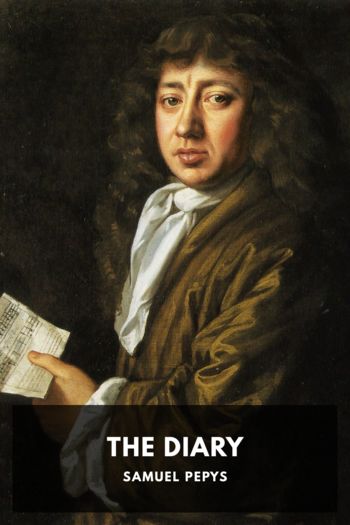The Diary, Samuel Pepys [e reader books TXT] 📗

- Author: Samuel Pepys
Book online «The Diary, Samuel Pepys [e reader books TXT] 📗». Author Samuel Pepys
William Montagu, second son of Edward, first Baron Montagu of Boughton, appointed Attorney-General to the Queen in 1662; Lord Chief Baron, 1676–1686. His second wife, the lady referred to by Pepys, was Mary, daughter of Sir John Aubrey, Bart. ↩
With Lady Anne Boyle. ↩
Sir G. Carteret’s eldest son, who married Lady Jemimah Montagu, July 31st, 1665. ↩
A tragedy by James Shirley, first printed in 1640. ↩
The Commissioners of Accounts were William, Lord Brereton, William Peirpoint, Sir George Savile, Giles Dunster, Sir James Langham, Henry Osborne, Alderman Sir William Turner, George Tompson, and John Gregory (Statutes of the Realm, vol. v, p. 624). ↩
The practice of gallants attending the theatre without payment is illustrated by Mr. Lowe in his “Betterton,” from Shadwell’s True Widow:
1st Doorkeeper Pray, sir, pay me: my masters will make me pay it. 3rd Man Impudent rascal, do you ask me for money? Take that, sirrah. 2nd Doorkeeper Will you pay me, sir? 4th Man No; I don’t intend to stay. 2nd Doorkeeper So you say every day, and see two or three acts for nothing.↩
Charles, eldest son of Dudley, fourth Lord North, noticed March 3rd, 1659–60. He was granted a peerage during his father’s lifetime as Baron Grey of Rolleston, and eventually succeeded his father as fifth Baron North. His mother was Anne, daughter of Sir Charles Montagu, of Cranbrook Hall, Essex, whence his connection with Lord Sandwich. ↩
Catharine, daughter to William Grey, Lord Grey of Warke, and widow of Sir Edward Moseley. She married, thirdly, Colonel Francis Russell (see November 15th, 1666), second son of Francis, fourth Earl of Bedford. —B. ↩
“An Act for taking the Accompts of the several sums of money therein men͠coned, 19 and 20 Car. II, c. 1. The commissioners were empowered to call before them all Treasurers, Receivers, Paymasters, Principal Officers and Commissioners of the Navy and Ordnance respectively, Pursers, Mustermasters and Clerks of the Cheque, Accomptants, and all Officers and Keepers of his Majesties Stores and Provisions for Warr as well for Land as Sea, and all other persons whatsoever imployed in the management of the said Warr or requisite for the discovery of any frauds relating thereunto,” etc., etc.
Statutes of the Realm, vol. v, pp. 624–627↩
The Life of the Renowned Sir Philip Sidney … Written by Sir Fulke Grevil, Knight, Lord Brook, a Servant to Queen Elizabeth, and His Companion and Friend, was published in 1652, “Printed for Henry Seile, over against St. Dunstans Church in Fleet Street.” This little book was reprinted by Sir Egerton Bridges at the Lee Priory Press in 1816. ↩
Sir Fulke Greville discourses much on foreign affairs, particularly in chapters ii, v, xv, and xvii, where he points out the dangers to this country and Europe generally from the combinations of great powers. He commends Queen Elizabeth for maintaining a fleet of her own ships and of those of “her fast friends the Netherlands” on the coast of Spain (p. 227). ↩
Sir George Savile of Rufford, co. Notts, Bart., created Baron Savile of Eland and Viscount Halifax, 1668; Earl of Halifax, 1679; and Marquis of Halifax, 1682. Died April 5th, 1695. ↩
Sir Lewis Dyve (1599–1669) was the son of John Dyve, of Bromham, in Bedfordshire, by Beatrix, daughter of Charles Walcot, Esq., who afterwards married John Digby, first Earl of Bristol. See note 3772. ↩
Rupert. ↩
This refers to the battle of the Dunes, June 24th, 1658, when Turenne defeated the Prince of Condé and Don Juan of Austria, who tried to relieve Dunkirk, which the English blockaded by sea, and the French attacked by land. It was prior to this battle that, despising the Spanish tactics, Condé said to the young Duke of Gloucester, “N’avez vous jamais vu perdre une bataille? Eh bien, vous l’allez voir.” Dunkirk surrendered on the 23rd, and afterwards was given up to the English, with whom it remained till Charles sold it. —B. ↩
“If they should incorporate with France, the Netherlands manufactures, industry, trade and shipping would add much to that monarchie both in peace and war. The natural riches of the French having been hitherto either kept barrain at home or barrainly transported abroad for lack of the true use of trade … which defect being now abundantly to be supplied, by this conjunction with the Netherlands, would in a little time, not onely puff up that active commonwealth with unquiet pride, but awake the stirring French to feel this addition to their own strengths, and so make them become dangerous neighbours by incursion in invasion to the Baltique sea.”
Greville’s Life of Sidney, p. 66↩
I.e., putting in order. ↩
George Hall, son of the celebrated Bishop Joseph Hall of Norwich, Archdeacon of Canterbury, 1660, and consecrated Bishop of Chester, May 11th, 1662. Died August 23rd, 1668. ↩
One of the famous works by the author of The Whole Duty of Man, which had just been published. ↩
I.e., a son of the Earl of Berkshire. See note 2643. ↩
There seem to have been, at this time, two distinct “Nurseries for Actors,” one in Golden Lane, near the Barbican. This establishment was ridiculed





Comments (0)